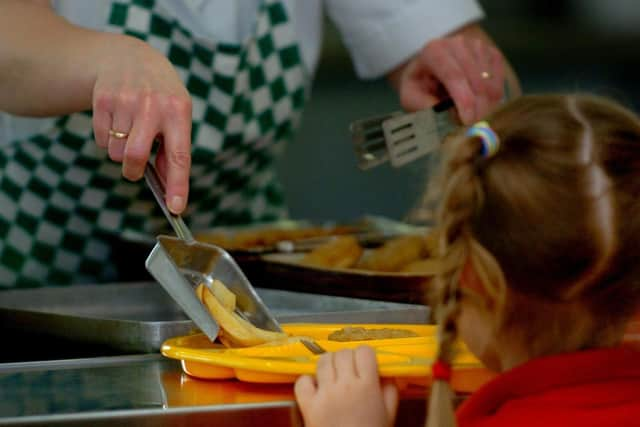Thousands more Free School Meals claimants in Leeds due to Covid
and live on Freeview channel 276
The head of a Leeds-based poverty charity has said this was sadly not surprising, as Covid hit lower-income families the hardest during the past year.
His comments come as a Leeds MP has accused the government of “using Covid as cover” to deprive schools of funding for some of Leeds’s most disadvantaged pupils.
Advertisement
Hide AdAdvertisement
Hide AdFigures obtained using the Freedom of Information Act show the government used FSM figures from October 2020, rather than more recent figures from January 2021, to work out pupil premium payments to schools – despite the fact the number of FSM claimants had increased during that time.


The figures also showed that the number of children registered for FSM in Leeds had grown from 24,507 in January 2020, to 29,356 in January 2021.
Dom Charkin, operations manager at Leeds-based social inequality charity Zest, said that health inequalities had already worsened before 2020, and that Covid exposed a system that could not cope.
“Undoubtedly the effects of 10 years of austerity had created the perfect storm,” he said. “Then along came Covid.
Advertisement
Hide AdAdvertisement
Hide Ad“It’s a disease that does not respect inequality – it has driven those already suffering from inequality into a worse situation, because people can’t work from home, and having children at home has meant household bills have gone up.
“We do know that people who are living in deprived areas or on the lower end of the income scale are also working in industries that are making large scale redundancies, or are under some form of furlough, so they are more likely to be out of work.
“We know that for people in low income jobs, having to be at home more, and having children at home will have increased bills.
“It’s of no surprise that there are more children on free school meals as a result of the last year of Covid.”
Advertisement
Hide AdAdvertisement
Hide AdPupil premium funding is designed to provide extra support to disadvantaged pupils. Mainstream primary schools receive £1,345 per pupil each year, while high schools receive £955.
Two censuses on the number of children claiming FSM are done every year – in October and January. The government uses these numbers to calculate pupil premium funding for each school.
In calculating the funding for the coming year, the Government used figures from the October 2020 census which, according to Leeds City Council, stood at 27,888.
However, the number of children claiming FSM had risen to 29,356 in the January 2021 census – an increase of 1,468 children.
Advertisement
Hide AdAdvertisement
Hide AdThis would mean a combined total of £1.813m less funding than if the January 2021 figures had been used.
Leeds Northwest MP Alex Sobel claimed the decision was effectively a cut in funding, but the government said the decision was to allow schools to plan effectively, and that funding would actually increase in the coming year.
He said: “The pupil premium introduced by the coalition was already a huge drop in funding compared to the funding under Labour, but Gavin Williamson has snuck in a huge cut to our school budgets using Covid as cover.
“What’s worse it deepens the funding gap between schools in better and worse off areas as it’s based on Free School Meal numbers in each school. Another sign if we needed it that the Tories are only interested in embedding inequality in education.”
Advertisement
Hide AdAdvertisement
Hide AdThe Government has said the amount spent on pupil premium would increase in the coming year.
A Department for Education spokesperson said: “We moved to using the October census to calculate pupil premium allocation so that schools can know their budget earlier in the year, helping them to plan ahead. We expect pupil premium funding to increase to more than £2.5bn in 2021-22, reflecting an increase in the number of eligible pupils.
“We are committed to ensuring every pupil gets an excellent education, no matter their background. That’s why we continue to allocate pupil premium funding to schools at unchanged per-pupil rates, alongside significant new catch-up and recovery funding, that is targeted towards schools most in need to support disadvantaged students’ attainment.”
The department added that its decision to base pupil premium funding for 2021-22 on October 2020 census data, instead of using the January census, would provide both schools and the department with “greater certainty” around future funding levels earlier in the year.
Advertisement
Hide AdAdvertisement
Hide AdIt said that a one-off £302m “Recovery Premium”, would build on the pupil premium, and targeted “towards schools most in need” to support disadvantaged students.
The Department for Education (DfE) has previously said that the average primary school will receive around £6,000 extra, and the average secondary school around £22,000 extra, as part of the one-off fund.
But the school leaders’ union suggested recently that the extra funding allocated to primary schools has been “wiped out” for many schools due to the changes in timing of pupil premium funding allocation.
Speaking last month, Paul Whiteman, general secretary of the NAHT, said: “These figures suggest that a large number of schools in England could see their education recovery funding wiped out as a consequence of this date change.
Advertisement
Hide AdAdvertisement
Hide Ad“A three-month gap may not seem like it would make a big difference but, given the volatile financial situation for many families due to Covid-19, it is an exceptionally bad time to implement this change.
“A significant number of children appear to have become eligible for help via pupil premium during that time and these children will now not receive any additional funding for another whole year.
“Worse, the children who are losing out are exactly those children most in need of additional support as they return to school.”